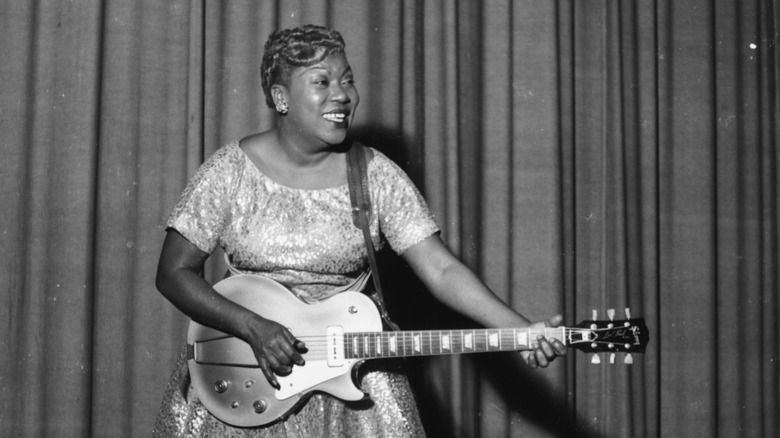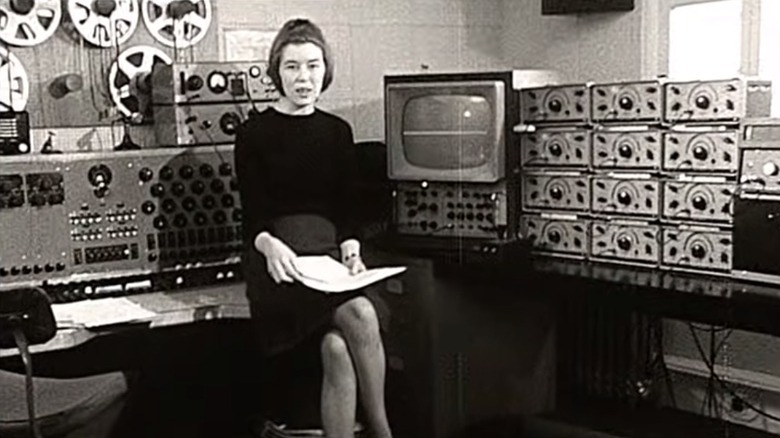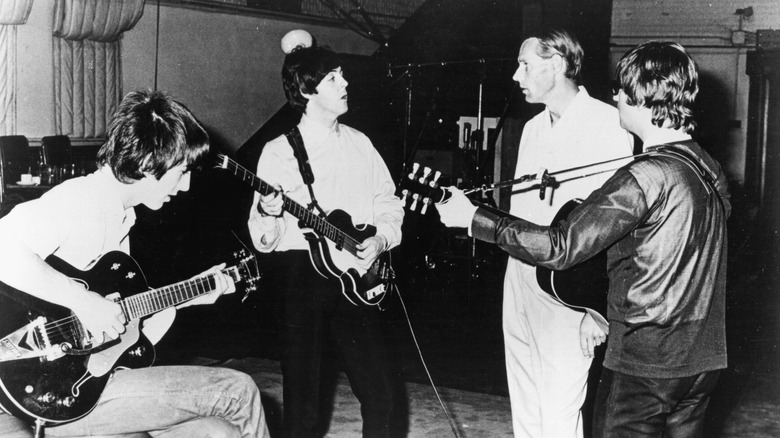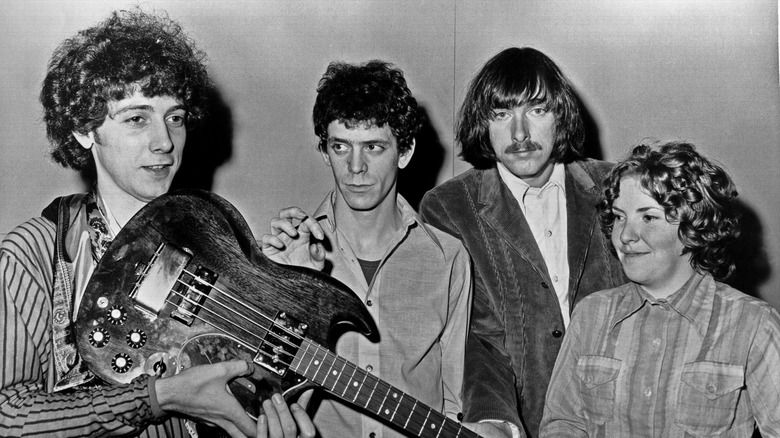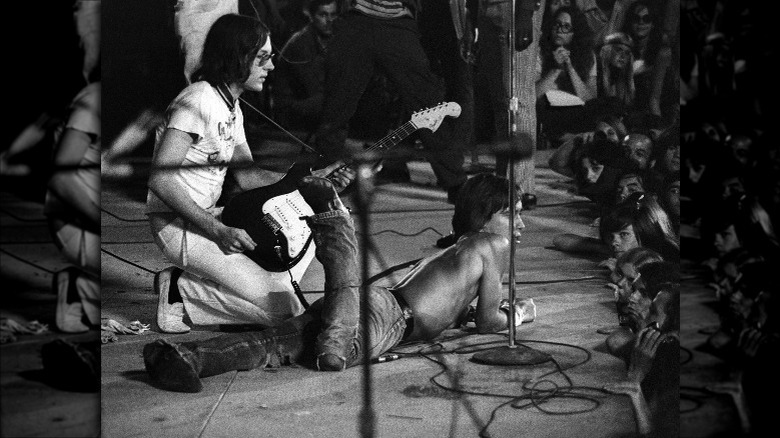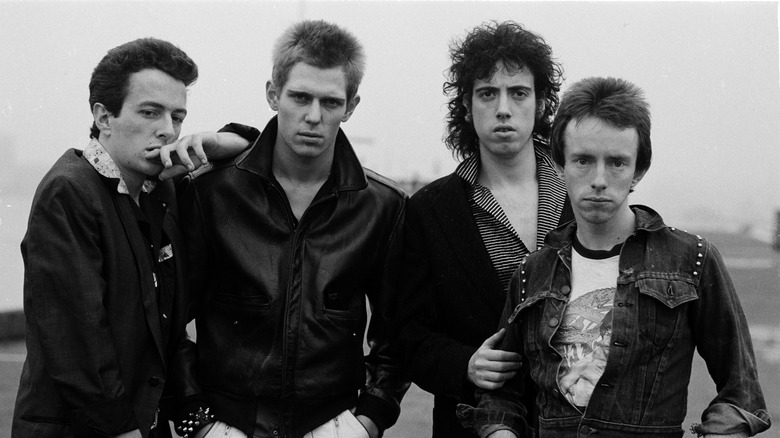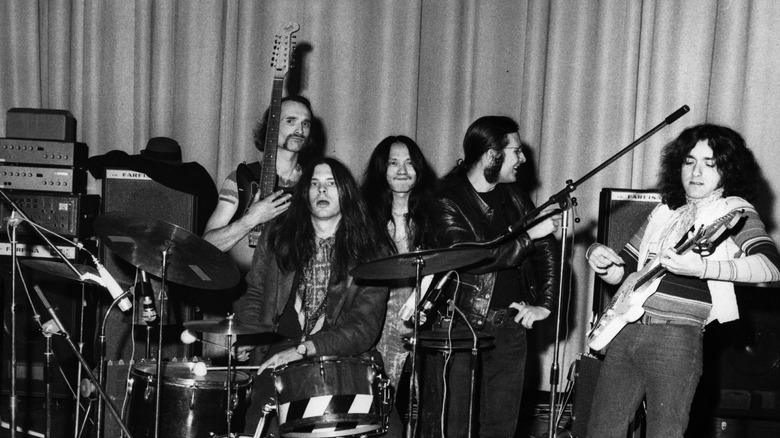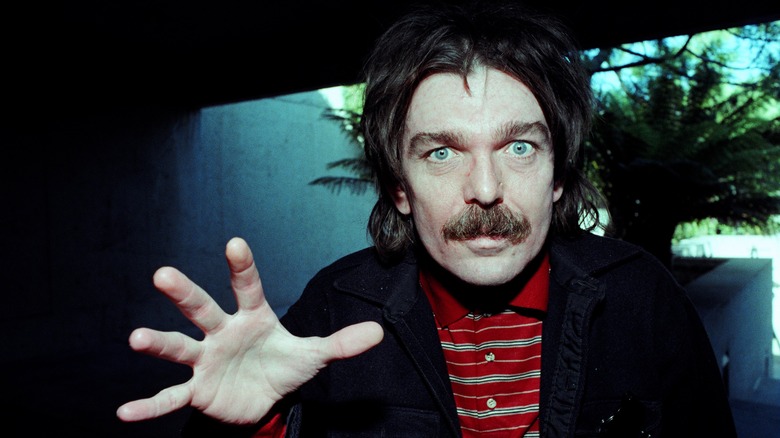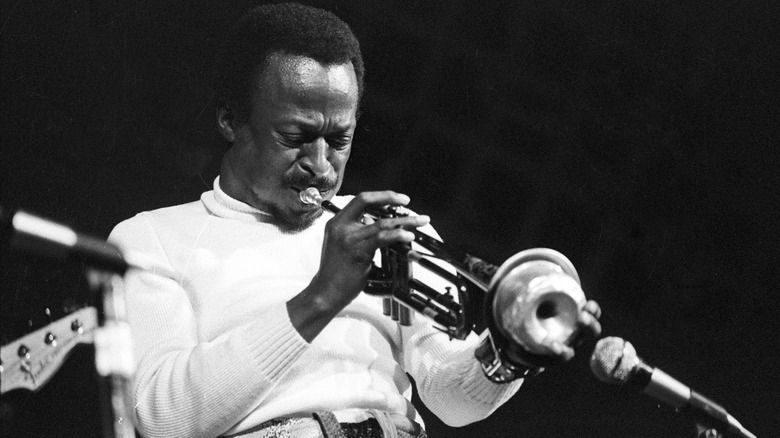Musicians Who Were Ahead Of Their Time
The history of popular music is the history of invention; almost every musician of note has been remembered because they did something different, somehow, from what had come before. Musical ability is, of course, important, but while being the fastest or most dexterous player might write you into the record books, it doesn't ensure you a place in musical history.
Rather, musicologists attach far greater importance to those artists and performers who take up the pieces of musical tradition that came before them, and somehow rearrange them to create a new path for those who follow after. Whether through technical innovation of stylistic divergences, the combination of previously unconnected genres or the development of new musical forms, it is the musicians we later describe as "ahead of their time" who play the greatest role in keeping popular music living and breathing, evolving, and changing — and therefore interesting — for each new generation of listeners.
Often, artistic innovation translates into critical and commercial success, while the musicians themselves become legends. Sometimes, however, important figures in the history of popular music remain overlooked. Here are some of the innovators who were undoubtedly ahead of their time, and who helped to shape the musical landscape as we know it today.
Sister Rosetta Tharpe invented rock and roll guitar
Many names come to mind when it comes to the pioneers of early rock and roll guitar: T-Bone Walker, B. B. King, and, more than any other genius on the 6-string, the one and only Chuck Berry. "If you wanted to give rock and roll another name you might call it Chuck Berry," said John Lennon — no mediocre guitarist himself — according to Chuck Berry's official website. But though Berry's timeless hits such as "Johnny B. Goode" and "Roll Over Beethoven" popularized the sound of guitar-led rock and roll and served as the foundation for the generation of musicians that came after him, Berry himself had his own inspiration, a woman guitarist whose name today is little known in comparison to that of Chuck Berry: Sister Rosetta Tharpe.
Tharpe was born in 1915, into a family of cotton pickers who were also devoted gospel singers according to The Heroine Collective. Tharpe began performing and touring the United States while still a child, and by the time she was an adult she was leading the group, accompanying herself on electric guitar with a sound that pushed the bounds of the genre she was a part of — and arguably created the sound of rock and roll in the process. According to Seattle Rep, Chuck Berry once claimed his musical career was "one long Sister Rosetta Tharpe impersonation."
Tharpe's reputation has grown in recent years, and in 2018 she was finally inducted into the Rock and Roll Hall of Fame.
Delia Derbyshire was an electronic pioneer
The history of modern music is riddled with uncelebrated women, and outside of the U.S. is no different. Ever heard of Delia Derbyshire? Possibly not — but you have definitely heard her music.
Delia Derbyshire, who died in 2001 at the age of 64, is the mastermind behind one of the most evocative theme tunes of all time: the intro music for the classic British sci-fi series "Doctor Who." As described by the BBC, the theme was based on a "basic tune" by the composer Roger Grainer, who for years retained sole credit for the work in the TV show's credits. But the truth of the matter is that the piece owes far more to the talents of Derbyshire, who had joined the BBC Radiophonic Workshop in London in 1960, where she worked on pioneering new techniques that would lay the foundations for a great deal of electronic music in the late 20th century and beyond.
Derbyshire has been praised for her early work in electronic music by the likes of both Pink Floyd and Portishead, while her most famous creation has had a huge influence all its own; according to trailblazing British hip-hop artist Roots Manuva (per The Guardian), the original "Doctor Who" theme is what he was attempting to mimic when he created the beat for his signature song "Witness (One Hope)."
MF DOOM built his own world
On December 31, 2020, fans of underground hip-hop were shocked to discover via an official announcement released by his family that iconic rapper and producer MF DOOM — real name Daniel Dumile — had died two months earlier. The cause of death was not disclosed.
DOOM generally kept his private life hidden from the press — indeed, he wore a mask whenever he made public appearances — though it was well known that the man behind the mask had experienced his fair share of tragedies. His brother and musical collaborator in the group KMD, Dingilizwe (aka DJ Subroc) was killed in a car accident in 1993 per Ambrosia for Heads, after which DOOM plunged into poverty and obscurity. In 2017, the same outlet reported that DOOM's son, Malachi, had died at just 14 years of age. At the time, DOOM was barred from re-entering the U.S., and was effectively in exile in his birth city of London.
But despite all these tragedies DOOM, starting with his debut solo album "Operation: Doomsday" in 1999, managed to forge new ground in the genre that today's hip-hop stars are still learning from. Eschewing the supposed "realness" of '90s gangsta rap, DOOM's discography is the result of an artist building his own world, complete with alter-egos — including the scumbag "vaudeville villain" Viktor Vaughn, and three-headed space dragon King Geedorah — who sometimes win, sometimes lose, whose stories are told in a highly intricate and idiosyncratic rhyme style which anticipated many of the "free-form" lyricism of the last decade. Meanwhile, Tidal has described DOOM's dusty production as the "blueprint" for the sound of independent rap. Quite a legacy.
The Beatles' analog studio trickery
To say The Beatles were influential would be an understatement; in fact, it is perhaps more truthful to say that The Beatles changed everything. The career of the Fab Four from Liverpool, England has come to serve as the template for many musical careers — starting with a radio friendly breakthrough and then attempting to move towards greater and greater experimentation — while their signature sound has been replicated by scores of bands and can be heard in the music of new groups even today.
As well as stellar songwriting and exceptional performances that put The Beatles head and shoulders above the vast majority of their peers in the 1960s, it was the band's revolutionary use of studio technology — much of it still in its infancy in the years The Beatles were recording together — to develop new techniques through which to commit to record new sounds that no-one had ever heard before that remains their greatest contribution to popular music. Facilitated by long-time Beatles producer George Martin and a bevy of innovative studio engineers such as Geoff Emerick (per Forbes), The Beatles' experimental period — encompassing such mold-breaking tracks as "Strawberry Fields Forever," "Tomorrow Never Knows," and "A Day In The Life" — was marked by a great degree of tape manipulation and ingenious new methods in 4-track recording to evocatively capture the burgeoning sound of the '60s counterculture.
Describing the importance of George Martin in The Beatles' recording sessions, Ringo Starr claimed (per The L.A. Times): "He was always there for us to interpret our strangeness."
The Velvet Underground's droning darkness
At the same time that Beatlemania was sweeping the globe and John, Paul, George, and Ringo were telling the world through earworm pop that "love is all you need," another band in New York was working along different aesthetic lines entirely, and, although they had only a humble following by comparison, their influence would go on to have a profound effect on rock and roll for decades to come.
"Modern music begins with The Velvets," claimed rock critic Lester Bangs, per the official Velvet Underground website, but though they are today considered one of the most important acts in pop music history, this was a group with little contemporaneous commercial success. Their first album, "The Velvet Underground & Nico," was produced by pop artist Andy Warhol, and released in 1967. Its audience was small, but its impact huge, as described by a famous quote from Brian Eno given to Musician magazine in 1982: "the first Velvet Underground record sold 30,000 copies in the first five years ... but I mean, that record was such an important record for so many people. I think everyone who bought one of those 30,000 copies started a band!"
Combining classically-derived avant-garde sounds such as drone and discordancy with disarming lyrics about drug use, death, and sexuality, The Velvet Underground's sonic palette and themes cemented rock and roll's synonymity with subversive behavior and the darkness of the human soul.
R. Stevie Moore showed the freedom of home recording
Many of the most important figures in music never quite found the audience they deserved, but nevertheless maintain a cult status and count among their followers many of the musicians who came along in their wake. One of these figures is R. Stevie Moore, who has been called variously the Godfather of D.I.Y. (via Art Tracke), lo-fi (via Fact Mag), and home recording as we know it, according to the subtitle of one of Moore's numerous greatest hits collections (per discogs).
Moore began recording as a teenager in the late '60s, and since then has recorded more than 2,000 songs on 400 albums, according to his official website. He retired in 2020, but over the course of a career spanning more than half a century (in which the vast majority of his material was self-released as limited editions via various mailing lists) the perennially obscure songwriter has led the way for many of the leading lights of indie and lo-fi, such as Ariel Pink and Mac DeMarco, who have not only taken cues from Moore's D.I.Y. aesthetic but also his singular way of negotiating the music business, and releasing music on his own terms.
The Stooges: punk before punk
Iggy Pop is now quite rightly considered a legend in his own right. His solo recording career, which was kick-started by his fruitful working relationship with fellow music mastermind and Berlin denizen David Bowie, has alone assured his place in the rock and roll firmament, while his on-stage persona and immense charisma ensures his name is etched in most critics' lists of the greatest live performers of all time.
But before Iggy was telling us about his "Lust For Life," he was fronting The Stooges, who, over the course of three albums, made rock and roll rock more than it had ever done before. Nothing about their musicianship was especially innovative; songs like "I Wanna Be Your Dog" and "TV Eye" were, on paper, songs that any '60s garage band might have come up with. But with Iggy's incendiary performances and the primal but exceptionally catchy riffs of guitarist Ron Asherton, The Stooges were playing punk before punk was even a genre, per The Saturday Evening Post. Even when punk came along almost a decade later, no-one could match them for raw power, and their influence has never waned among hard-rocking guitar bands.
Bjork never stops innovating
Even from her first solo album "Debut" in 1993 and the breakthrough single "Play Dead," it was obvious that Bjork was a performer looking to do things her own way. Her vocals alone separated her from her contemporaries, and even today there is no one who quite sounds like her. Nevertheless, Bjork's innovative and expressive vocal oscillations opened the door to some of this century's finest idiosyncratic singers, from Joanna Newsom to Fiona Apple.
But beyond her unmistakable voice is Bjork's talent for melding disparate genres. As noted by i-D, in the early '90s electronic music was nowhere near as prevalent in pop as it is today (in fact, in the 21st century it's almost ubiquitous). Bjork's early discography proved that electro could marry great pop songwriting, and result in seriously big hits.
Per the same source, Bjork's experiments with tech have continued beyond music itself. With 2011's "Biophilia," Bjork pioneered the album-as-multimedia release, accompanying the album with a range of interactive apps through which to explore its 10 songs. A decade later, such interactive material is still at the cutting edge of how music is released.
The Clash broke the bounds of punk
For many, The Clash is as punk as punk can get — the highpoint of a movement that was already dissolving in the early '80s. From their self-titled 1977 debut onwards, The Clash forged their way to prominence with a raw, authentic sound and irresistible songwriting that made them destined to gain mainstream acceptance.
But while they came to dominate a genre often known for its purist following, The Clash also became punk vanguards by reaching across stylistic divides and opening up punk's sonic palette. As described by Stereophile, as a London band The Clash formed in a multicultural melting pot, where genres such as reggae couldn't help but seep into their music even in their earliest releases. Their genre-blending experiments would hit a high point in 1979 with the release of "London Calling," a classic that touches on everything from blues-rock to jazz and R&B to ska, and which is considered one of the most influential albums of all time, while the band's embracing of political subject matter and their support of anti-racist and anti-fascist movements has influenced activist musicians ever since.
CAN's early alternative experiments
"We were not thinking. When you make music together, you have to reach a common accident," explained Holger Czukay to Mojo in 2016 (via NPR). As the main creative force behind Krautrock legends CAN — alongside fellow founding members Michael Karoli and Irmin Schmidt — Czukay led his troupe of classically trained, experimental, outsider, and oddball musicians to explore new soundscapes and audio possibilities that few in the late '60s and early '70s would have thought possible.
But despite the above quote, the main thing about CAN was that they were never self-indulgent in the manner of much of the prog-rock produced by many of their peers, with their improvisation and experimentation never veering too far from catchy hooks and crowd-pleasing grooves, as noted by AllMusic.
The band explored a wide range of styles over the course of their career, producing 12 hugely influential albums in the process. Their towering achievement, however, is undoubtedly "Tago Mago," a 1971 double album and the band's first to feature the vocalist with whom the band are most associated, Damo Suzuki. Drowned in Sound described it as "arguably the most influential rock album ever recorded," and cites the album's enormous effect on the sounds of many of alternative music's leading lights, most notably Radiohead, who have taken cues both from CAN's instrumentation and Suzuki's distinctive vocal style.
Captain Beefheart's surrealist blues
Today, "Trout Mask Replica" — the masterpiece of Captain Beefheart & The Magic Band, released in 1969 — is considered both a bona fide avant-garde classic and, it has to be said, something of a meme among the internet's music fans. Intentionally discordant, baffling, and undefinable, the album still generates fierce debate among listeners about its experimental achievements (or lack thereof).
Beefheart (aka Don Van Vliet) was a school friend of fellow Californian musician Frank Zappa, and though the two often collaborated — with the infinitely more commercially successful Zappa often acting as patron for Beefheart's experiments — their approaches to music differed widely. As described by drummer Art Tripp, Zappa was a disciplined and sober craftsman, who worked methodically to produce his weird works. Vliet, on the other hand, worked instinctively: "Don had never studied music, and was oblivious to formal rhythm, music notation, or music theory such as pitches, scales, chords, or keys," says Tripp (per The Radar Station) "Yet he had a good ear, and was especially adept at singing and playing harmonica in the delta blues style. He didn't know the first thing about a soprano sax, but he could play convincing free-form style."
Beginning with approximations of traditional blues performers, Beefheart worked throughout the years towards his own idiosyncratic sound made up of non-traditional musical structures and surrealistic lyrics, a body of work that had a huge impact on a young Tom Waits, who, upon hearing Beefheart's music for the first time, immediately switched to a more experimental style. "Trout Mask Replica" is "indispensable for the serious listener," Waits told The Guardian.
Miles Davis changed music (five or six times)
Per Rolling Stone, Miles Davis was at a public event when he was asked by a "politician's wife" what important things he had done with his life. Davis is reported to have replied: "Well, I changed music five or six times." Few critics would disagree with his assessment and most consider Davis the chief innovator of a genre the raison d'etre of which is innovation itself.
As Davis' quote suggests, it is difficult to pinpoint one moment in the trumpeter and bandleader's long career that is of singular importance among all others. Was it in 1957, when the Miles Davis album of the same name heralded the "Birth of the Cool," alone creating the "cool jazz" genre through the combination of be-bop and classical techniques? Was it in 1970, and the release of "B****es Brew," which opened jazz up to rock, funk, and psychedelia? Or Was it with the 1959 album "Kind of Blue," a modal jazz masterpiece which, alongside John Coltrane's "A Love Supreme," is considered possibly the greatest jazz album of all time (per Jazzwise)?
Taken together, Davis' manifold accomplishments make him a musical behemoth, whose influence goes beyond jazz — and even beyond music — to challenge how we think about art itself. According to Davis (per udiscovermusic): "It's not about standing still and becoming safe. If anybody wants to keep creating they have to be about change."

